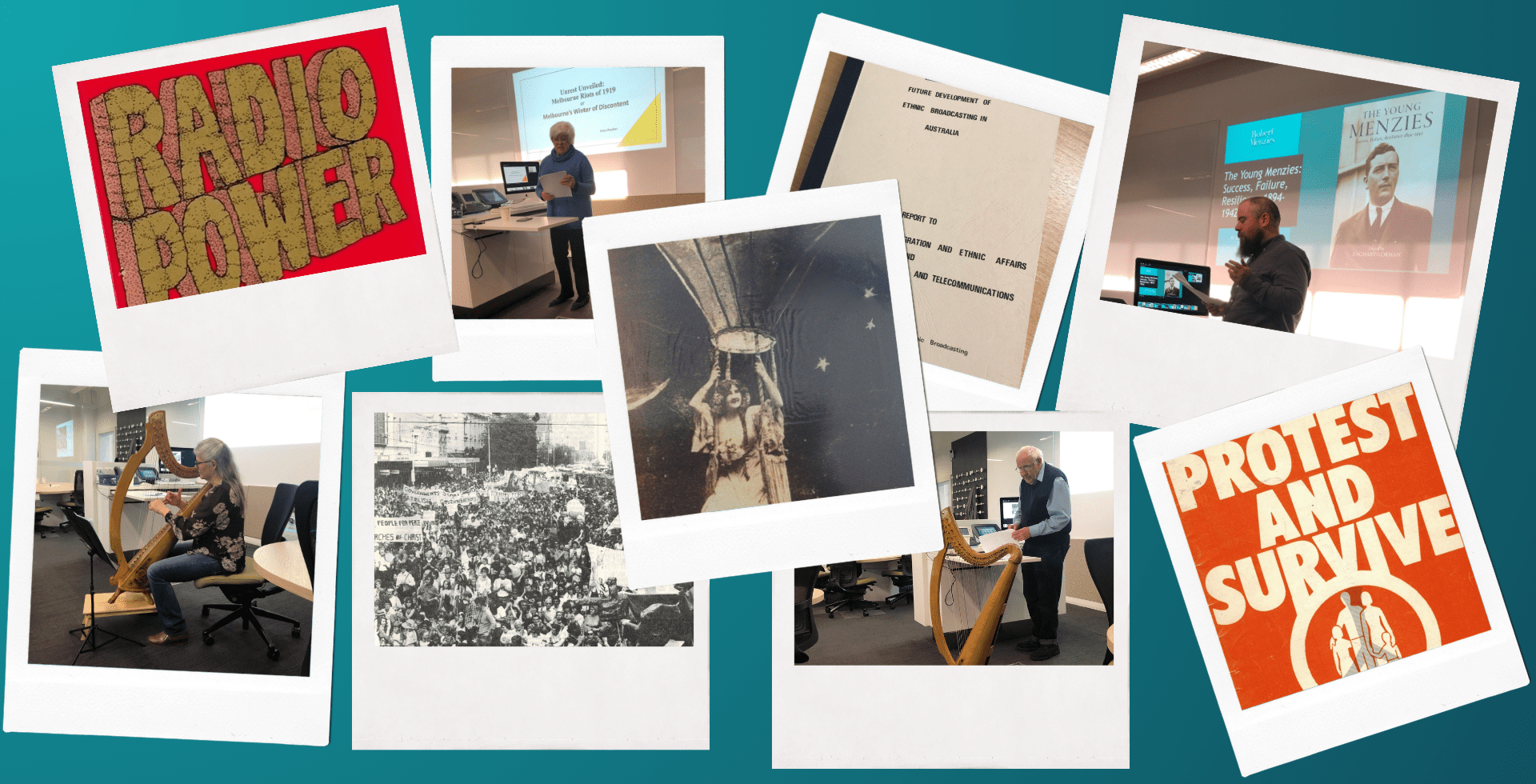
Annual Fellows’ Research Day
On 21 July 2023, the SHAPS Fellows & Friends of History held the annual Fellows’ Research Day. Fay Woodhouse wrote an overview of the day for Forum, discussing the speakers and their topics, as well as other enjoyable aspects of the day.
The Annual SHAPS Fellows’ Research Day, held on a predictably cold Melbourne morning in July, was warmly opened by Chips Sowerwine who has been part of the Fellows group since 2008 when he retired. He referred to the first annual Research Days, and paid tribute to Juliet Flesch and Fay Woodhouse for their establishment of the Fellows Group. We are very happy to report that 31 Fellows and friends registered for the day. Sadly, four had to cancel at the last moment due to ill health – they were Charles Coppel, Wendy Dick, Graham Dudley and Sheila Fitzpatrick. Apologies also came from June Factor, Juliet Flesch, Rosemary Francis, Catherine Kovesi, Ian Rae and Tony Ward.
In attendance were: Richard Brown, Geoffrey Browne, Greg Burgess, Alex Butler, Cecily Close, Helen Davies, Tonia Eckfeld, Jean Ely, Georgina Fitzpatrick, Susan Foley, Zachary Gorman, Kathleen Henshall, Rod Home, Anthea Hyslop, John Lack, Val Noone, Linda Notley, David Palmer, John and Marion Poynter, Carolyn Rasmussen, Dianne Reilly, Mary Sheehan, Chips Sowerwine, Frances Thiele, Christine Walker, Fay Woodhouse.
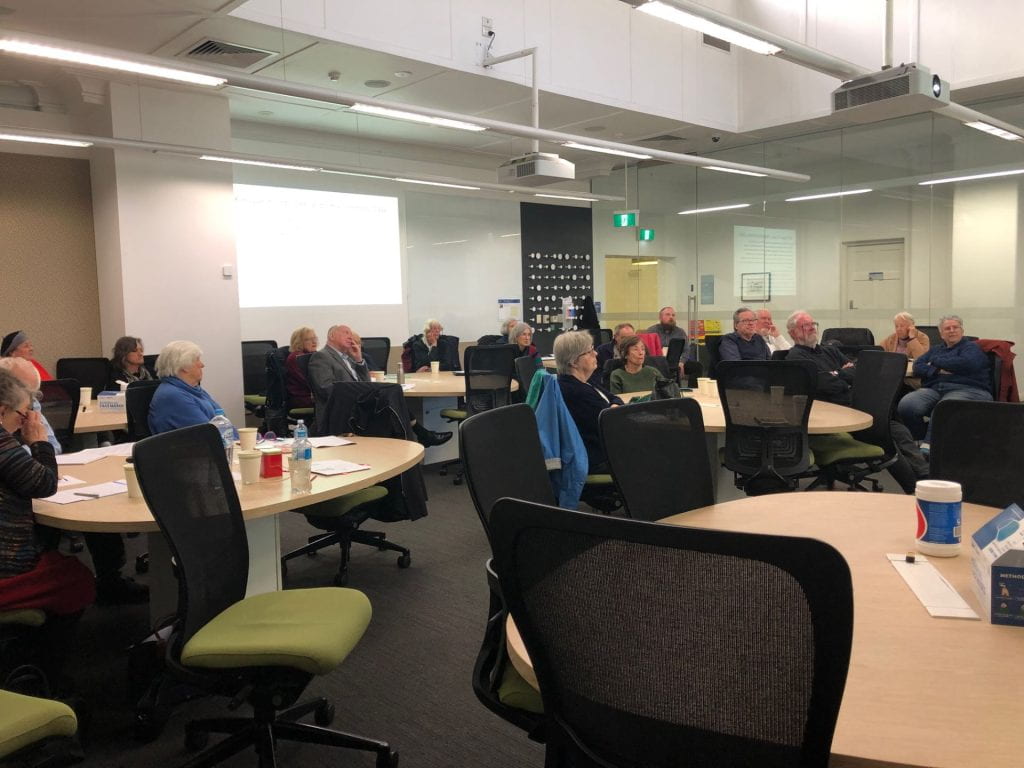
Val Noone, ‘Religion in the 1980s Nuclear Arms Crisis: Catholics in Melbourne’
Our first speaker, Val Noone, presented his paper on a largely overlooked aspect of religion in the 1980s – Catholics in Melbourne and the nuclear arms crisis. While this aspect of religious history was unknown to most of his audience, Val’s story was able to shine a light on a grassroots movement that was active during the early 1980s in response to the nuclear arms race.
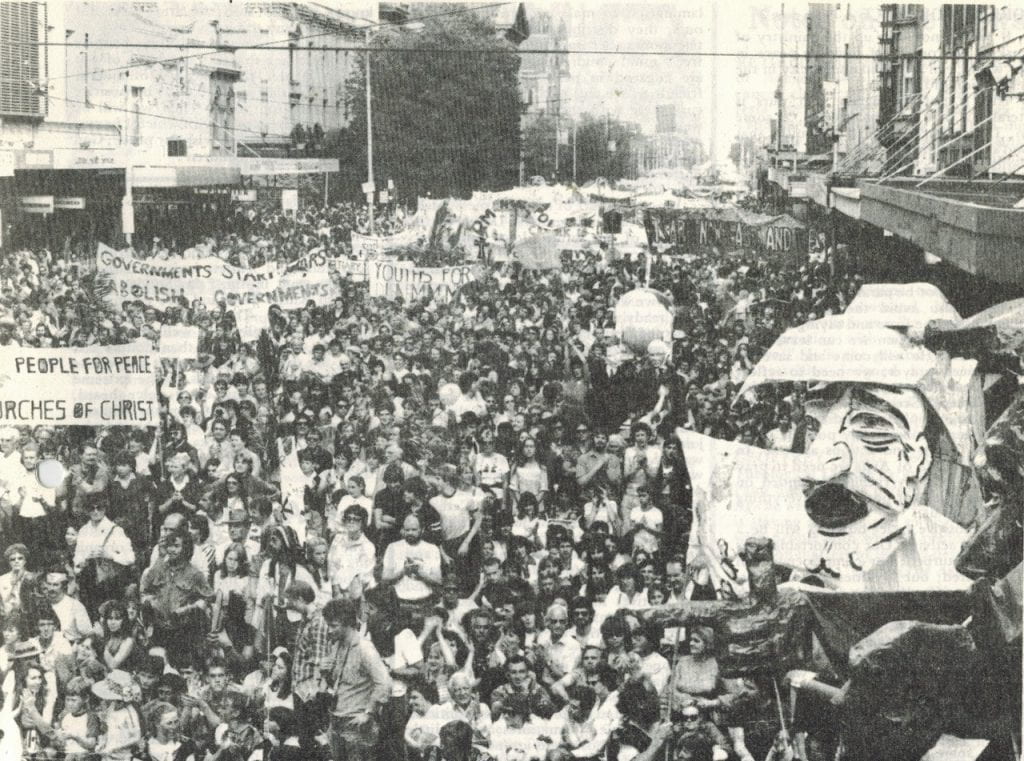
Val and his wife, Mary, were members of the Melbourne-based group, Catholics for Peace, which was part of the People for Nuclear Disarmament coalition. His presentation included a number of newspaper clippings and images of pamphlets from his own collection. Val drew our attention to the group’s part in eclipsing the pro-nuclear policies of BA Santamaria and the National Civic Council.
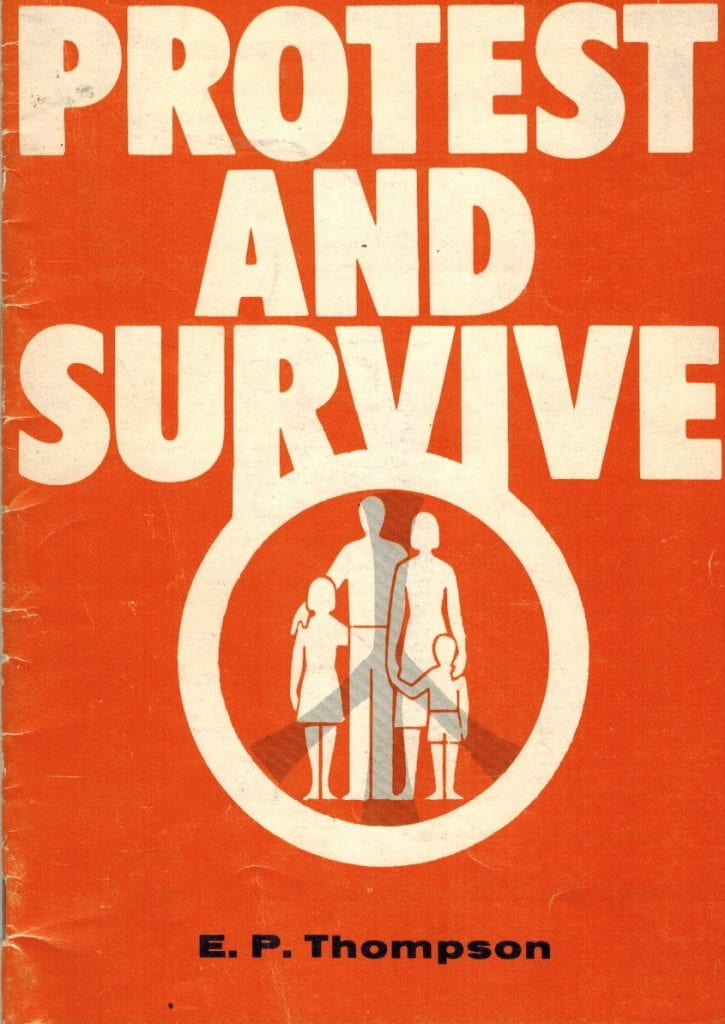
Fay Woodhouse, Alex Butler & Richard Brow, ‘Secret Report Reveals why Government Closed ABC Radio Station in 1977′
Fay’s talk provided the context to the search for a missing Cabinet paper, written by Ian Lindenmayer et al. in July 1976 and always known as ‘The Lindenmayer Report’. This report was misleadingly labelled as ‘Ethnic Radio Stations – Financial Assistance’ at the National Archives in Canberra.
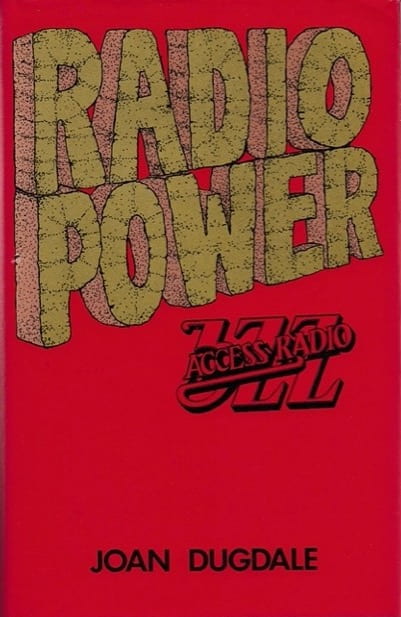 The Fraser government accepted the recommendations in this report, favouring Melbourne’s ethnic radio station 3EA over the ABCs multi-lingual access radio station 3ZZ. After two years on air, the ABC station was closed in July 1977 by the Fraser government: they exerted political pressure on the ABC Commission who acquiesced.
The Fraser government accepted the recommendations in this report, favouring Melbourne’s ethnic radio station 3EA over the ABCs multi-lingual access radio station 3ZZ. After two years on air, the ABC station was closed in July 1977 by the Fraser government: they exerted political pressure on the ABC Commission who acquiesced.
This, we believe, is arguably the single most serious attack on the ABC’s independence in its history. Fay’s former 3ZZ colleagues, Alex Butler and Richard Brown, answered a wide range of questions, which added greatly to the discussion.
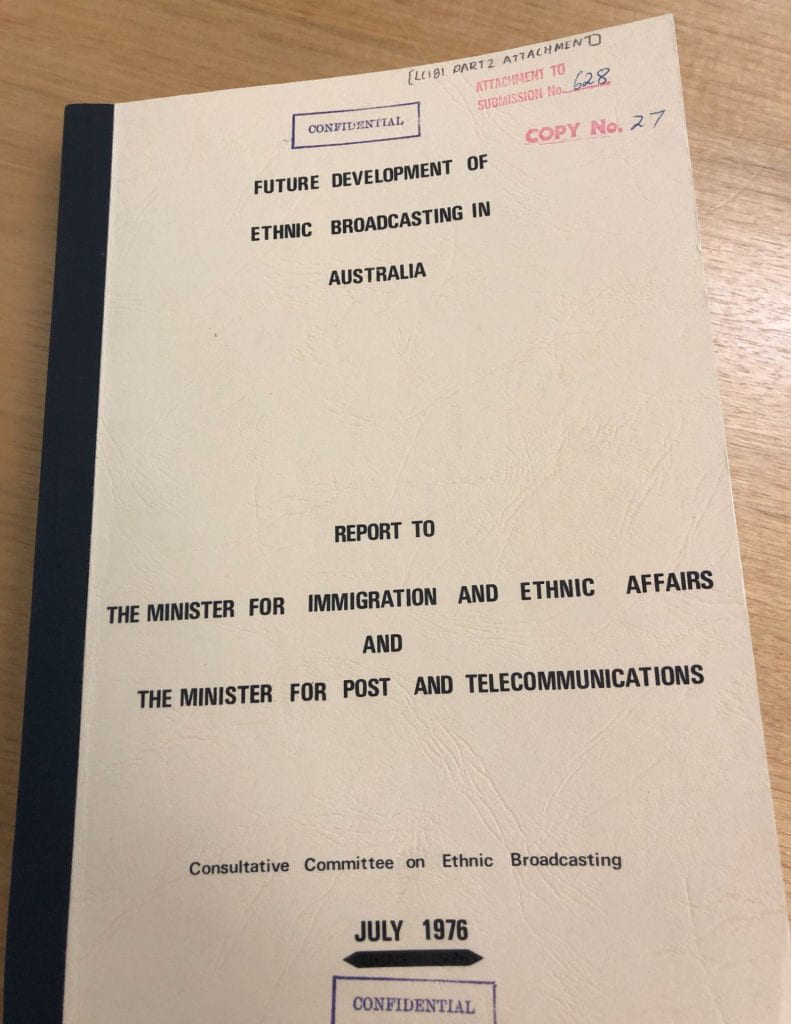
Tonia Eckfeld, ‘The Dunera Voyage’
Many in the audience knew of the HMT Dunera and its arrival in Australia in 1940 but little of the voyage, when 2,542 men were transported from Liverpool England to Australia on the Dunera in hellish cramped, unsafe, and unsanitary confinement. Most were Austrian and German civilian refugees from Hitler’s oppression; many were Jewish. The internees suffered deprivation, brutality and abuse. Robbery and beatings by their British guards occurred throughout the 58-day voyage. Tonia’s uncle, Waldemar Eckfeld (aged 24), and father, Reinhold Eckfeld (aged 18), were two of those on board, with Waldemar suffering shocking violence, which she described in her talk. Her family archive was the source of wonderful documentation from the voyage, including drawings by Reinhold of their shipboard experiences. The fact that British government records were destroyed makes the job of the family historian much more difficult, not to mention the injustice to the people involved. Tonia’s presentation generated rich and fruitful discussion on the writing and focus of this aspect of her family history. The feedback she received was useful and she commented that she came away with a fresh mind to complete the last part of her book – the introduction.
Zachary Gorman, ‘The Young Menzies: 1894–1942’
While many in the audience thought they knew much of the character of the older Robert Menzies, the young Menzies presents as equally an intriguing figure. Zac’s presentation raised many issues for discussion, including Menzies’s early aspirations; the truth of his failure to serve in the First World War; his legal career; and his early and subsequent political career.
As well as highlighting the work of writers and subjects of his edited book, Zac addressed the question of the benefits and drawbacks of a multi-contributor approach to a biography of such a well-known Australian.
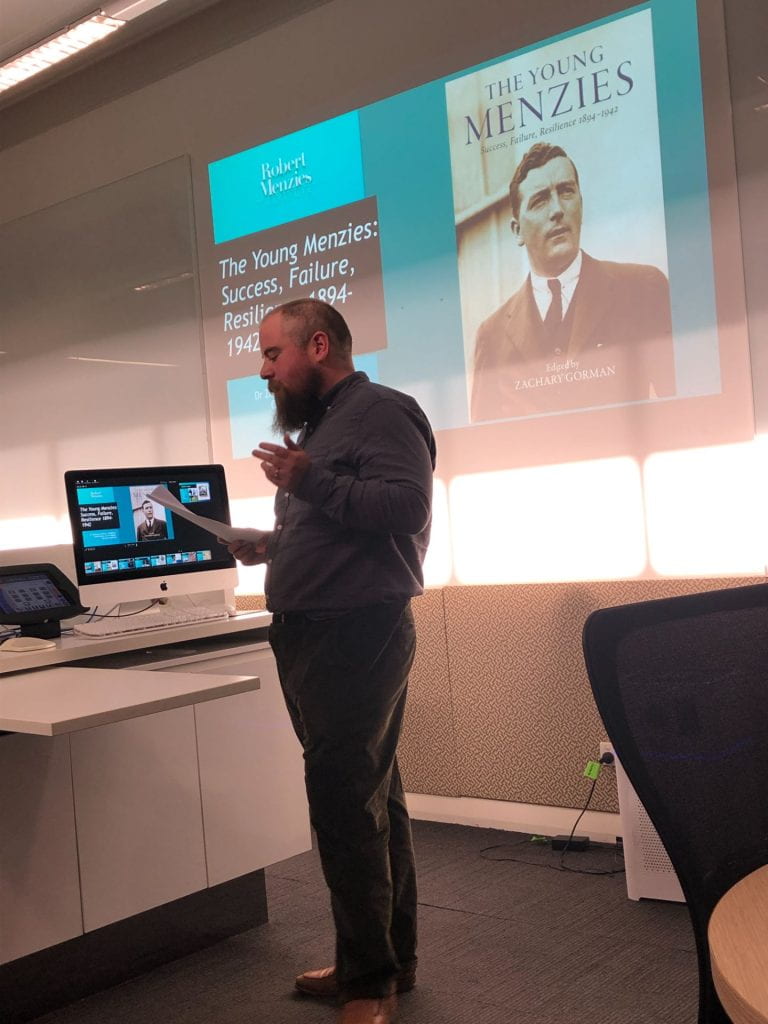
Mary Sheehan, ‘Unrest Unveiled: Spanish Flu and the Melbourne Riots of 1919’
It came as a surprise to many in the room the extent of unrest in Melbourne during the 1919 Spanish Flu Pandemic. Mary argued that the pandemic created a pervasive sense of anxiety and uncertainty among workers, amplifying existing discontent over wartime price increases and stagnant wages.
The month of July 1919 was a month of ongoing protest marches – and one had occurred on 21 July, the very day we were meeting. The number of unemployed was high at this time. The psychological impact of the disease also heightened risk aversion and bolstered the willingness of workers to fight for improved conditions and wages. Mary’s paper generated much discussion and there was clearly great interest in her topic.
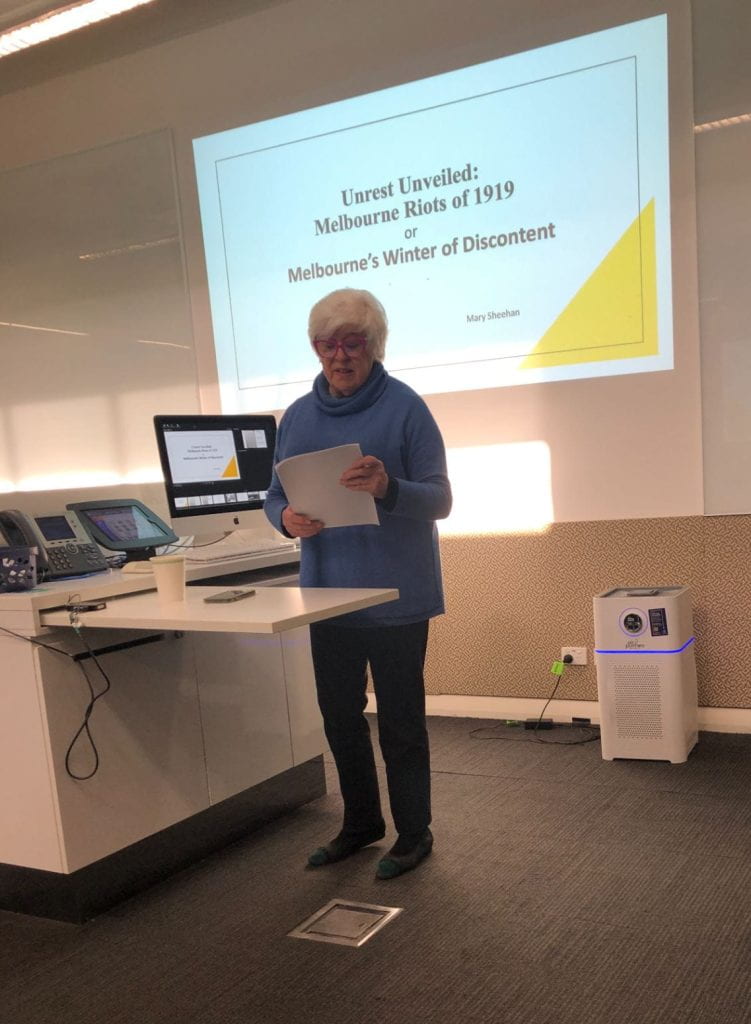
Dianne Reilly, ‘Patrick Bonaventure Geoghegan: Pioneering Catholic Priest’
Scholar of early Melbourne, and an authority on Melbourne’s Lieutenant Governor, Charles Joseph La Trobe, Dianne presented her paper on a name known to many – but a character that was largely unknown. Father Patrick Bonaventure Geoghegan (pronounced gay’gan) proved to be something of a surprise package! Born in Dublin in 1805 and orphaned at eight, he joined the priesthood at a very young age. He was ordained in 1830 and in 1837 sailed for Australia, working in Sydney before being sent to Melbourne. Once in Melbourne, he was keen to build a church for his flock, which he began: the foundation stone was laid in October 1841. St Francis Church was opened in October 1845. Missing out on the position of the first Bishop of Melbourne, he was appointed Vicar-General in 1848. It seems his passion was for education and, once appointed Archbishop of Adelaide, he successfully campaigned for Catholic churches in Adelaide and built several schools and twenty churches. After returning to Dublin, he died in 1864. An unusual personality, a bronze statue of Geoghegan outside St Francis Church hints at the personality of the man.
Georgina Fitzpatrick, ‘The “Balloon Girl”: The Brief Career of Nancy Maher’
As Georgina pointed out in her talk, the history of James Cassius Williamson, known for his theatrical business, J C Williamson, is well known. What was not known to our audience was the career of Nance Maher. What a story it is! Born in Sydney, in her teens Nance Maher began a career in the theatre as a trained opera singer-in-waiting who became known as ‘The Balloon Girl’ because of her exploits in theatres in Melbourne and Sydney.
Nance could be seen flying from what looks like a hot air balloon across the stage. A risky job, especially when, in one performance, an audience member tried to pull her down from the stage with his stick! Nance went on to have another career – as Nance Barnard, who married Georgina’s great-uncle Horace. The story of Nance is one part of a family history written during the lockdowns and titled From Convicts to Chorus Girls: The Experiences of one Anglo-Jewish Family 1815–1920. We look forward to its publication.
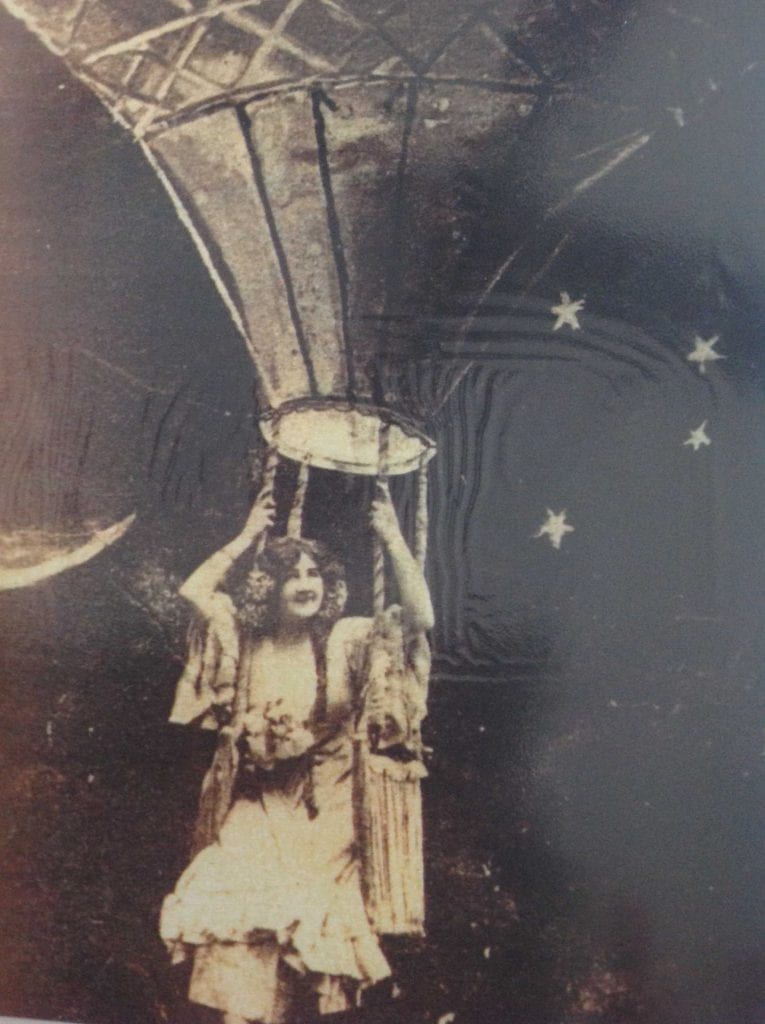
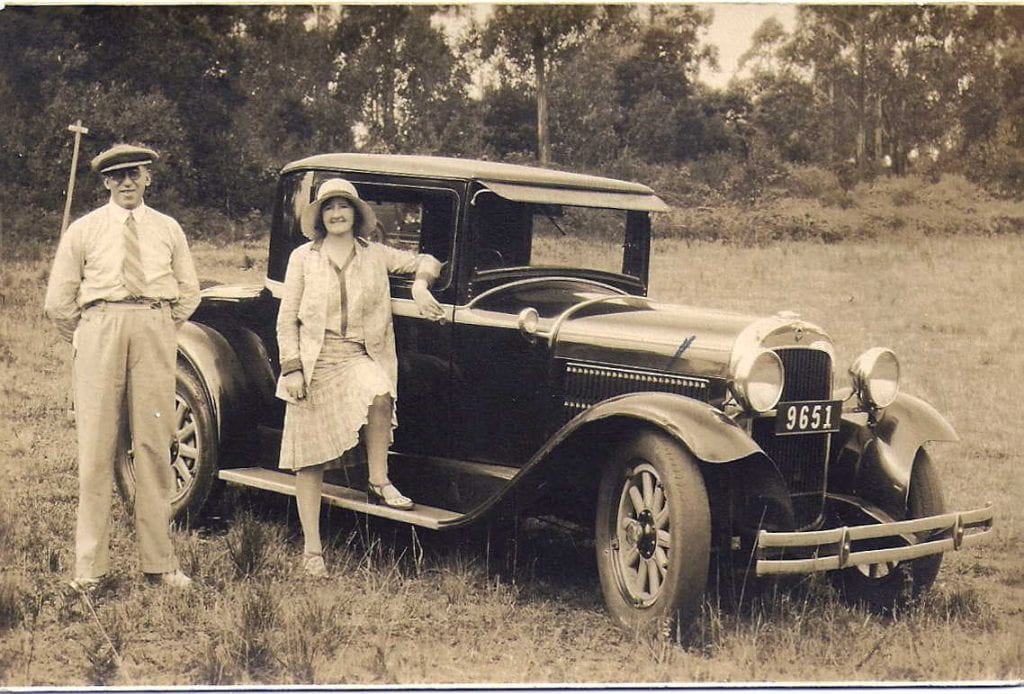
Frances Thiele, ‘The Irish Harp in Victoria: Music and Historical Evidence’
Coming at the end of a fabulous day of papers and great discussion, we welcomed Fran Thiele and her harp. As she pointed out, studying the harp and other musical instruments may be a somewhat esoteric aspect of colonial history. Yet, we all had so much to learn! To begin, we heard about the history of the Irish harp in Victoria. We learned that she had found and had restored a harp that had arrived in Victoria in 1840. More than that, her evidence of the provenance of her harp was clear: it appears in a nineteenth-century photograph of the harp, part of a group of harpists and other musicians at a Ballarat school.
Theory was fine, then Fran also explained to us the way a harp is played. And then, of course, our wonderful day was topped off with a performance of some well-known Irish tunes played on the harp on the very harp she brought with her and shown in the photograph! Members of the audience appreciated her talk and asked many questions. Her performance topped off a wonderful day.
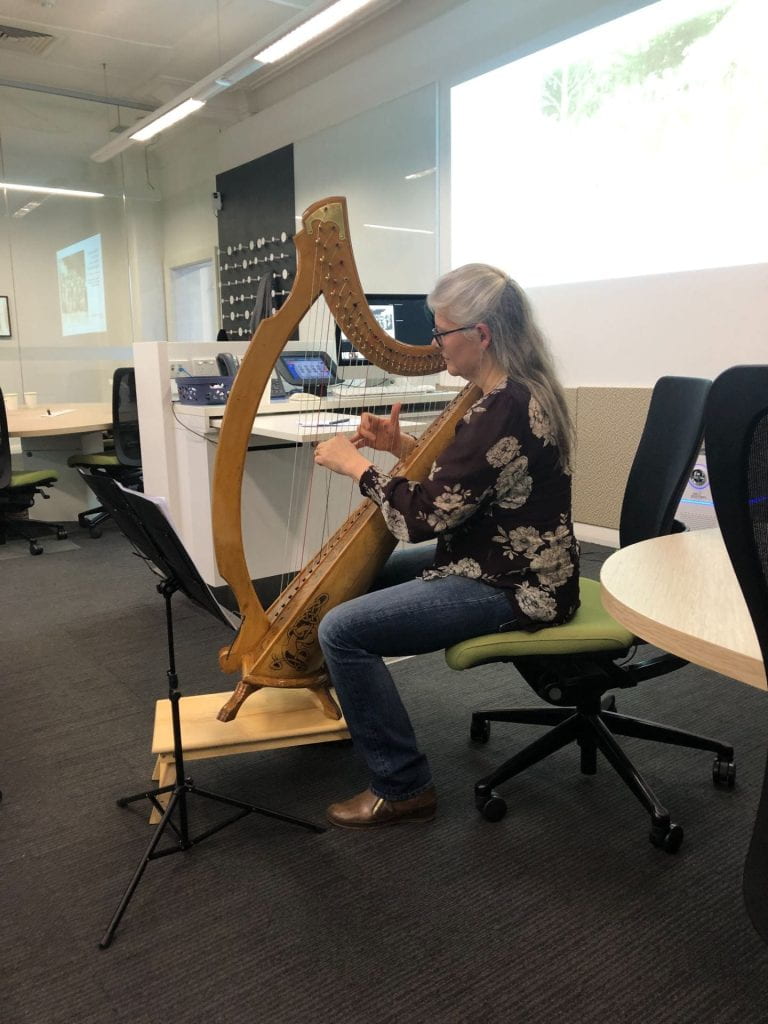
Closing remarks on SHAPS Fellows’ Research Day, 21 July 2023, by Val Noone
In his talk about the young Robert Menzies, Zachary Gorman quoted the conservative Irish nationalist Edmund Burke, which reminds me of Burke’s comment on the importance of history, namely, “people will not look forward to posterity who never look back to their ancestors”. Today’s seminar is, again, a good example of work by those who believe in looking back in order to look forward.
My opening paper took us back to the 1980s when the issue of nuclear war was on people’s minds, as it is again, and I drew attention to the neglected role of religion in the nuclear disarmament campaign of that era.
Fay Woodhouse spoke about a secret report on the government’s intervention to close radio station 3ZZ in 1977, and she also remarked on current dangers. For that session we were fortunate to have brilliant participation from the floor by Alex Butler and Richard Brown, two ABC journalists/radio producers who lived through that saga.
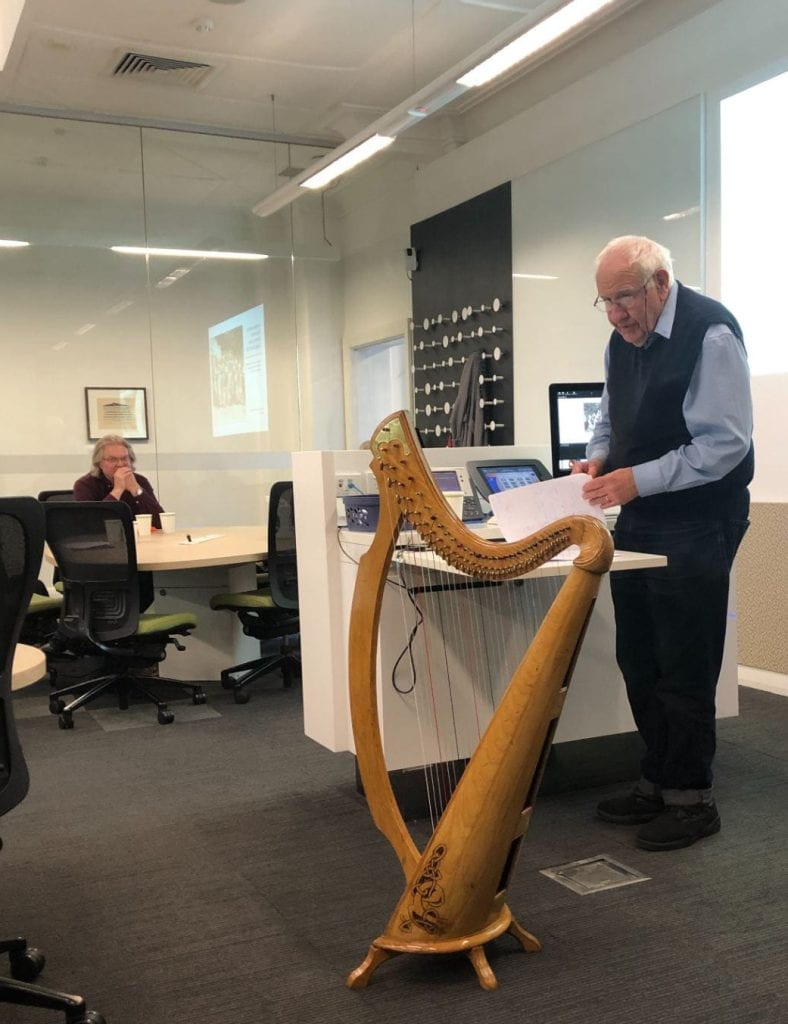
Over recent years we have had presentations by June Factor and Ken Inglis about the German Jewish refugees who were transported to Australia on the Dunera in 1940 as ‘enemy aliens’. Today, Tonia Eckfeld, daughter of one of those refugees, argued that the dominant historiography has concentrated on success stories in Australia. Challenging that, she spoke about the misfortune which her uncle Waldemar (who came with her father) suffered at that time.
Zachary Gorman’s paper on the young Menzies drew thanks from two of our leading Australianists, John Lack and Carolyn Rasmussen. Zachary stressed Menzies’s emphasis on individual rights. We need to say, however, that the problems of our day such as global warming and nuclear war cannot be solved by individual effort but can only be solved if humanity works together.
Mary Sheehan updated us on her research into the 1919 flu pandemic. It was a pleasure to hear the level of detailed information she has uncovered along with new angles from a bird’s-eye view, when she spoke about the 5500 people involved in a near riot in Melbourne over the pandemic and related industrial unrest on 21 July 1919. For fun, I made a note that today is the 104th anniversary of that occasion.
The role of religion in public life made a second appearance when Dianne Reilly evoked a picture of the harmony between Christian denominations in the early years of Melbourne, as reflected in the life of Father Patrick Geoghegan. As with other papers, Dianne evoked lively discussion from the floor.
Georgina Fitzpatrick rescued from obscurity Sydney singer Nance Maher and, in particular, her spectacular stunt as ‘The Balloon Girl’ in J C Williamson’s company in the early 1900s. When Georgina recalled Maher’s part in The Quaker Girl, I understood better why my aunt Edith loved to play the sheet music from that show.
In the last paper of the day Frances Thiele gave a fascinating presentation on the historical Irish harp, including showing us a rare nineteenth-century harp found in Australia and recently restored by Bob Ballinger, on which she played a Thomas More piece and some of Carolan’s Concerto.
Today’s papers have been good examples of historical works which show how we come to be the way we are, and thereby, show that history is contingent, that is, things do not have to be the way they are. On your behalf I wish to thank Fay Woodhouse for the tower of work she put in on our behalf to make this day happen. And I wish to thank Greg Burgess for his work on the technical aspects of the day.
*****
We were very pleased to have booked Room 257 (although not easy to find) because the facilities were excellent. Seating was comfortable and two screens were available to make reading PowerPoint presentations much easier than in some rooms we have used. This year we tried a new approach to catering. Given the location of the room, we enjoyed a selection of individual Bento Boxes. They were a hit! We had a choice of Greek, Asian, sandwiches, quiches and a gluten free choice. The consensus was that these are worth ordering again. At the end of the day, we also enjoyed cheese and biscuits, a glass or two of wine and even more conversation. On a straw poll, our 2023 Fellows & Friends Annual Research Day was voted the Best Ever!
Fay Woodhouse